In this brand new series of courses, Marissa Fourie will help you ensure you are using patient-centered care by using the Calgary-Cambridge model during patient assessment.
Communication is the most important part of any patient interaction. Good communication has the chance to completely change your patients' outcomes, while bad communication destroys a person's trust and possibly belief in the right treatment for them.
Skilful communication between patient and doctor contributes to accurate diagnoses, effective management, better patient compliance and improved clinical results. Research supports the application of patient-centered medicine, which prescribes an individualized biopsychosocial approach to patient communication and management rather than a generic acquisition of biomedical information.
In this new course program, you will explore the Calgary-Cambridge Model, which provides practical evidence-based guidelines for a comprehensive medical interview in various medical disciplines.
The Tutor – Marissa Fourie
Marissa Fourie is a physiotherapist with a special interest in effective patient communication and the treatment of acute and chronic pain
Marissa Fourie is a registered physiotherapist based in Stellenbosch, South Africa. She is particularly interested in diseases of the musculoskeletal system, the treatment of acute and chronic pain, pediatrics and post / prenatal health.
Marissa holds a BSc in Physiotherapy from the University of the Free State and a Masters in Physiotherapy from the University of Stellenbosch. She has insight and experience in a variety of physical illnesses, from sports injuries, office-related pain, back and neck problems, pediatrics, breast diseases, prenatal care and orthopedic rehabilitation. 
The courses
Communication – the most powerful tool in the box
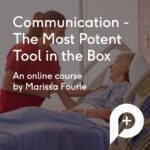 Communication is the key to success
Communication is the key to success
The person behind the patient
 Everyone has a unique style of communication and a unique personality. As a healthcare professional, it is important to ensure that your communication style matches the patient's personality. Marissa Fourie will help you communicate better by describing the different personality types along with case studies and then guiding the healthcare professional to tailor their communication to best support the patient.
Everyone has a unique style of communication and a unique personality. As a healthcare professional, it is important to ensure that your communication style matches the patient's personality. Marissa Fourie will help you communicate better by describing the different personality types along with case studies and then guiding the healthcare professional to tailor their communication to best support the patient.
The patient is in the center
Culture and communication
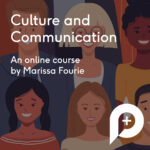 Culture can be defined as a homogeneous set of values, norms or attitudes (often deeply rooted) that are shared by a specific group of people. Each culture has different visible and invisible aspects. The invisible aspects of culture will determine how people perceive health and illness and how they react to it. In this third course, Marissa Fourie describes how culture can affect health in many ways, including communicating and presenting symptoms, coping styles, willingness to seek medical help, bias / preference for management strategies, and trust and compliance with a health professional .
Culture can be defined as a homogeneous set of values, norms or attitudes (often deeply rooted) that are shared by a specific group of people. Each culture has different visible and invisible aspects. The invisible aspects of culture will determine how people perceive health and illness and how they react to it. In this third course, Marissa Fourie describes how culture can affect health in many ways, including communicating and presenting symptoms, coping styles, willingness to seek medical help, bias / preference for management strategies, and trust and compliance with a health professional .
Become a Versatile Communicator
Initiation of the medical interview
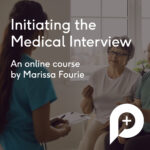 The Calgary-Cambridge Guide to Medical Communication is a framework to guide healthcare professionals through a consultation. It encompasses both the content and the processes that are essential for strong communication. In this course, the fourth in the program, Marissa Fourie introduces you to the first part of the framework, the initiate session. This course aims to introduce the learner to the Calgary Cambridge Guide to Medical Communication and specifically addresses the “Initiate the Session” component of the framework
The Calgary-Cambridge Guide to Medical Communication is a framework to guide healthcare professionals through a consultation. It encompasses both the content and the processes that are essential for strong communication. In this course, the fourth in the program, Marissa Fourie introduces you to the first part of the framework, the initiate session. This course aims to introduce the learner to the Calgary Cambridge Guide to Medical Communication and specifically addresses the “Initiate the Session” component of the framework
Explore communication models
Collecting Information – The Psychosocial Assessment
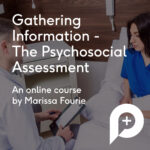 Traditionally, the acquisition of biomedical information forms the basis of the medical interview; Equally important, however, is examining the patient's perspective of their symptoms and the role they play or will play in the path to recovery. In this fifth course in the program, Marissa Fourie will discuss the psychosocial approach required in information gathering based on the Calgary-Cambridge Guide to Medical Communication.
Traditionally, the acquisition of biomedical information forms the basis of the medical interview; Equally important, however, is examining the patient's perspective of their symptoms and the role they play or will play in the path to recovery. In this fifth course in the program, Marissa Fourie will discuss the psychosocial approach required in information gathering based on the Calgary-Cambridge Guide to Medical Communication.
Understanding the patient's perspective
Gathering Information – Underpinning Biomedical History
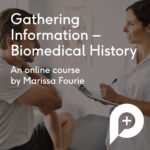 Collecting biomedical information is an essential skill in medical practice. The development of the bio-psychosocial model has emphasized the importance of history-taking in order to gather as much information as possible to support optimal clinical reasoning. In this sixth course of the program, Marissa Fourie will discuss the essential elements of information gathering along with the use of the International Functional Classification (ICF), Disability and Health in the clinical reasoning and hypothesis generation process.
Collecting biomedical information is an essential skill in medical practice. The development of the bio-psychosocial model has emphasized the importance of history-taking in order to gather as much information as possible to support optimal clinical reasoning. In this sixth course of the program, Marissa Fourie will discuss the essential elements of information gathering along with the use of the International Functional Classification (ICF), Disability and Health in the clinical reasoning and hypothesis generation process.
Gather the Information You Need
Communication in the physical examination
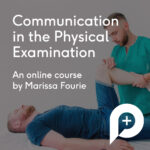 Good communication is important to promote the doctor-patient relationship. Patients report better results when they are listened to and addressed with interest and respect. It is easy to understand the principles of good communication, but mastering the skill requires good practice. In this course, Marissa Fourie introduces the elements of effective communication during the physical exam. This is the seventh course in the Communication and Medical Interviewing program.
Good communication is important to promote the doctor-patient relationship. Patients report better results when they are listened to and addressed with interest and respect. It is easy to understand the principles of good communication, but mastering the skill requires good practice. In this course, Marissa Fourie introduces the elements of effective communication during the physical exam. This is the seventh course in the Communication and Medical Interviewing program.
Interact with your patient during the examination
Explanation and planning
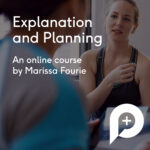 Patients seek help from healthcare professionals to find answers to their questions. They want to know what is causing their pain, how it can get better, and what treatment options are available. Communicating this information requires a range of skills that will enable patients to make informed decisions and effectively manage their care. In this eighth course of the Communication and Medical Interview Program, Marissa Fourie covers the phase of explaining and planning the Calgary-Cambridge Model.
Patients seek help from healthcare professionals to find answers to their questions. They want to know what is causing their pain, how it can get better, and what treatment options are available. Communicating this information requires a range of skills that will enable patients to make informed decisions and effectively manage their care. In this eighth course of the Communication and Medical Interview Program, Marissa Fourie covers the phase of explaining and planning the Calgary-Cambridge Model.
Provide feedback for joint decision-making
Completion of the medical interview
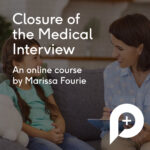 Communication is one of the most effective tools a physiotherapist has to help the patient with his complaints. The Calgary-Cambridge Model guides you through every aspect of the session to ensure the most effective time management and information retrieval. This course focuses on the final phase of the session, how the session closes, and is the final course in the communication and medical interview program.
Communication is one of the most effective tools a physiotherapist has to help the patient with his complaints. The Calgary-Cambridge Model guides you through every aspect of the session to ensure the most effective time management and information retrieval. This course focuses on the final phase of the session, how the session closes, and is the final course in the communication and medical interview program.
Complete the interview effectively